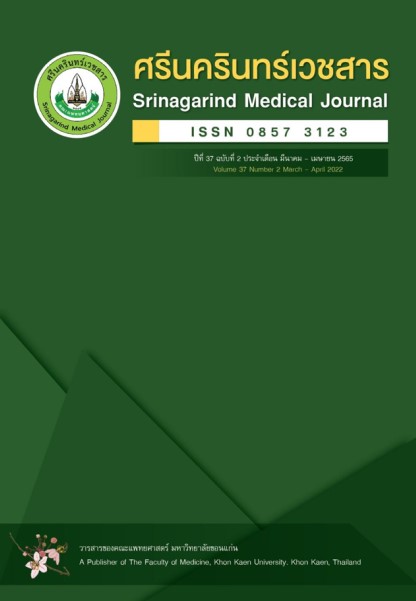ลิโมนินฟื้นฟูการสร้างอสุจิและการสร้างฮอร์โมนเทสโทสเตอโรน ในหนูอ้วน
Abstract
Limonin Improves Testicular Spermatogenesis and Testosterone Production in Obese Rats
หลักการและวัตถุประสงค์: โรคอ้วนมีความเกี่ยวข้องกับความผิดปกติของอัณฑะ ส่งผลให้การสร้างอสุจิและฮอร์โมนเทสโทสเตอโรนลดลง จนเกิดภาวะมีบุตรยากในเพศชาย การศึกษานี้มีวัตถุประสงค์เพื่อศึกษาผลของลิโมนินต่อการสร้างอสุจิและเทสโทสเตอโรนในหนูอ้วน
วิธีการศึกษา: หนูทดลอง Sprague-Dawley เพศผู้ถูกแบ่งออกเป็น 3 กลุ่ม ได้แก่ กลุ่มควบคุม กลุ่มโรคอ้วน และกลุ่มโรคอ้วนที่ได้รับลิโมนิน ใน 4 สัปดาห์สุดท้ายของการทดลอง (LM 100) เมื่อสิ้นสุดการทดลอง วัดน้ำหนักตัว ไขมันในช่องท้อง เทสโทสเตอโรนในซีรัม จำนวนและการเคลื่อนที่อสุจิ และตัวชี้วัดความเครียดออกซิเดชันในอัณฑะ
ผลการศึกษา: โรคอ้วนส่งผลเพิ่มน้ำหนักและมวลไขมัน ลดจำนวนและการเคลื่อนที่ของอสุจิ และเทสโทสเตอโรนในซีรัม อย่างมีนัยสำคัญทางสถิติ เมื่อเปรียบเทียบกับกลุ่มควบคุม (p < 0.05) การให้ลิโมนินช่วยลดน้ำหนักและมวลไขมันได้อย่างมีนัยสำคัญ (p < 0.05) และเพิ่มจำนวนและเปอร์เซ็นต์การเคลื่อนที่ของอสุจิและระดับเทสโทสเตอโรนในซีรัม (p < 0.01) MDA ในอัณฑะของหนูอ้วนเพิ่มขึ้นอย่างมีนัยสำคัญทางสถิติ และการได้รับ ลิโมนินช่วยลดระดับ MDA ในอัณฑะอย่างมีนัยสำคัญ (p< 0.01)
สรุป: ลิโมนินสามารถใช้เป็นผลิตภัณฑ์เสริมอาหารเพื่อการป้องกันความผิดปกติของอัณฑะที่เกิดจากโรคอ้วน
Background and Objective: Obesity has been found to be associated with testicular dysfunction, resulting in decreased sperm quality, testosterone production and consequently male infertility. The aim of this study was to determine the effects of limonin on sperm count and motility and serum testosterone level in obese rats.
Methods: Male Sprague-Dawley rats were divided into the following groups; the control, the diet induced-obesity (Obesity), the obesity treated with limonin at dose 100 mg/kg (LM 100) groups at the last four week of the experiment. At the end of experiment, body weight and retroperitoneal fat were measured. Sperm count and motility measurement was performed. Serum testosterone and testicular MDA level were investigated.
Results: Obesity significantly elevated body weight and fat accumulation while decreased the caudal epididymal sperm concentrations and percentages of sperm motility and serum testosterone compared to the control groups (p < 0.05). Treatment with limonin significantly reduced body weight and fat mass (p < 0.05). An improvement of sperm concentrations and percentages of sperm motility and serum testosterone was observed in LM 100 group (p < 0.01). Testicular MDA significantly increased in Obesity, while limonin treatment significantly diminished testicular MDA level (p < 0.01).
Conclusion: Limonin treatment potentially represents as a supplementation for the prevention of testicular dysfunction induced by obesity.


